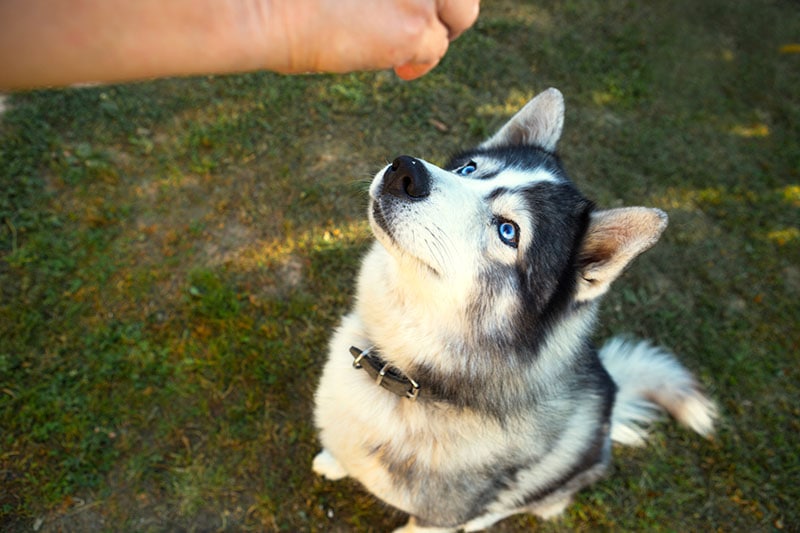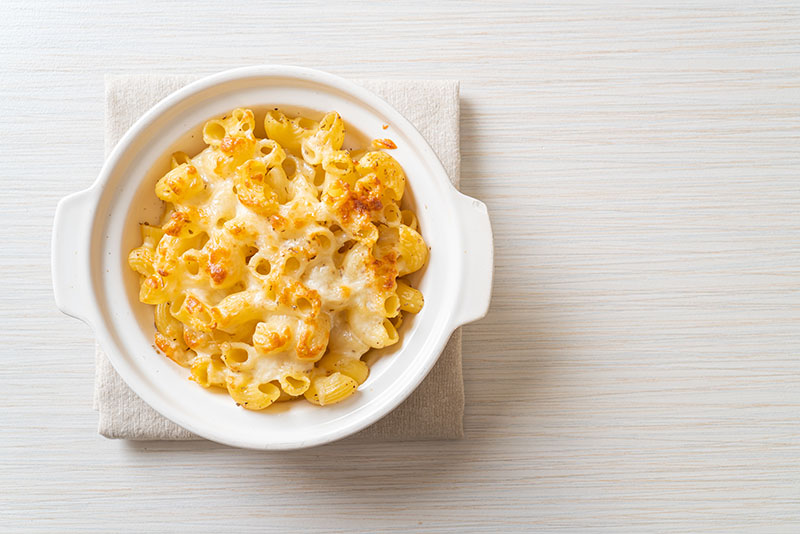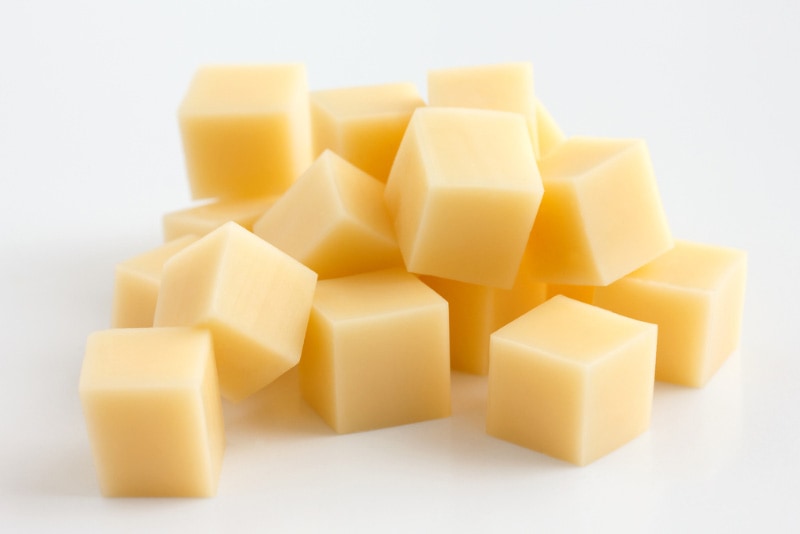Sometimes, it can feel like dogs have mastered the art of emotional manipulation. With a simple tilt of their head and an eagerly wagging tail, your dog can make you feel guilty for not sharing your snacks. You may be compelled to offer your dog whatever food they want to get rid of those sad puppy-dog eyes, but as a responsible dog owner, you know some human snacks are unsafe for your pet. If you are wondering whether you can feed Babybel cheese to your dog, you will be happy to hear that it is a perfectly safe treat – in moderation!
Of course, even safe treats should only be given in moderation. In this article, we’ll discuss the benefits and health concerns of feeding Babybel cheese to your dog, so stick around to learn more.
Benefits of Babybel Cheese
Compared to other cheesy human snacks, Babybel cheese is a relatively healthy treat for your dog. Its limited ingredients make it a better option than many commercial cheese snacks.
The ingredients in Babybel cheese include the following:
- Pasteurized milk
- Cheese cultures
- Salt
- Enzymes
Another benefit of Babybel cheese is that it is considered lactose-free. That is good news for your dog since many canines are lactose-intolerant.
The idea that dogs can be lactose-intolerant may seem strange, especially since they spend much of their puppyhood drinking their mother’s milk. However, once puppies are weaned from their mother’s milk, their bodies produce less lactase, which is the enzyme responsible for breaking down lactose.
As a result, your adult dog will almost certainly be lactose-intolerant. If your dog consumes something with lactose, they may experience signs of gastrointestinal distress such as vomiting and diarrhea. Thankfully, since the original Babybel cheese does not contain lactose, your dog’s lactose intolerance is not something to be concerned about.
There are a variety of Babybel cheese flavors, including Babybel Swiss cheese. Like the original flavor, Babybel Swiss cheese contains limited ingredients and is lactose-free. It’s an especially good option for your dog, as Swiss cheese is among the healthiest types of cheese you can give your dog.

Photo Credit: Simol1407, Shutterstock
Health Concerns of Feeding Babybel Cheese to Your Dog
While Babybel cheese can be a great treat for your dog, there are still some health concerns that you should be aware of. Cheese typically contains high amounts of saturated fats and salt, both of which are bad for your dog.
Saturated Fats
While Babybel cheese is relatively low in sodium (at least compared to other cheese snacks), it is high in saturated fats. Frequently feeding this treat to your dog, or in large amounts, can create health issues over a long period, such as obesity. In severe cases, your dog may suffer from pancreatitis, especially if they are particularly sensitive to fatty foods. Babybel cheese can occasionally be a treat, and they’re a nifty way to hide your dog’s medicine, but it shouldn’t be a regular snack.
If your dog is still a puppy, it is recommended that you hold off on feeding them Babybel cheese. Puppies have sensitive stomachs, so even a tiny bit of cheese could induce gastrointestinal distress.

Photo Credit: Brad K Covington, Shutterstock
The Wax Seal
Another feature of Babybel cheese that you should consider is the wax seal. If your dog dives into a bag of Babybel cheese while the wax seal is still intact, it could cause an intestinal blockage, so make sure that you keep unopened Babybel cheese out of your dog’s reach.
How Much Babybel Cheese Can You Feed to Your Dog?
Feeding your dog treats such as Babybel cheese requires careful portioning. For general estimates, you can refer to the table below. In the chart, a piece of cheese is 1-inch wide and ¼-inch thick.
| Dog Size | Amount of Babybel Cheese |
|---|---|
| Small (under 20 lbs) | 1/4 – 1/2 piece |
| Medium (20-50 lbs) | 1/2 – 1 piece |
| Large (50+ lbs) | 1 – 2 pieces |
While giving your dog a tasty snack can be fun, remember that all treats should be given in limited quantities. Most of your dog’s diet should be made up of well-balanced commercial dog food. No more than 10% of your pet’s meals should contain treats such as Babybel cheese.
If your dog is on a special or prescribed diet, it would be best to avoid treats like Babybel and check with your veterinarian.
Types of Cheese That Are and Are Not Safe for Your Dog
Since many dogs are lactose-intolerant, you may wonder which cheeses may be safe for dogs to eat. While any cheese may cause some digestive issues for your dog, especially if given in excess, some are healthier than others.
The cheeses listed below should not be fed to your dog:
- Cream Cheese: Cream cheese is low in lactose and sodium, but it is high in fat. It also may contain additives that are toxic for dogs, such as garlic, onion, xylitol, or chocolate. Therefore, it is best to avoid cream cheese.
- Mac and Cheese: Mac and cheese contain lactose, sodium, unhealthy fats, and preservatives. It is not safe to feed it to your dog.
The cheeses below are safe to serve as treats:
- Cottage Cheese: Cottage cheese is one of the healthier types of cheese for your dog. It is low in fat, calories, and lactose. In addition, it contains calcium and protein.
- String Cheese: String cheese is usually lower in lactose and sodium than other cheeses, but it depends on the brand and type of cheese you choose. For instance, skim mozzarella string cheese has extremely low lactose levels, making it a great treat for dogs. However, the stringiness of the cheese can be a serious choking hazard, so it is best to chop it into bite-sized cubes if you feed it to your dog.

Photo Credit: gowithstock, Shutterstock
Frequently Asked Questions
Q: Can dogs have Babybel cheese every day?
A: No, Babybel cheese should be given to dogs in moderation. While it can be a safe treat, frequent or excessive consumption can lead to health issues such as obesity.
Q: Can I give my lactose-intolerant dog Babybel cheese?
A: Yes, Babybel cheese is considered lactose-free, making it a suitable option for dogs with lactose intolerance.
Q: Are all flavors of Babybel cheese safe for dogs?
A: Most flavors of Babybel cheese are safe for dogs, including the original and Swiss cheese flavors. However, be mindful of the ingredients in flavored variations to ensure they are safe for your dog.
Conclusion
Many tasty cheese treats are on the market, but few are as safe for your dog as Babybel cheese. With low levels of lactose and sodium, Babybel can be an excellent treat for your dog as long as you feed it in moderation. However, if your dog experiences any adverse effects, avoid serving it in the future. To determine if Babybel cheese is suitable for your dog, consult your vet.
Featured Image Credit: Moving Moment, Shutterstock
